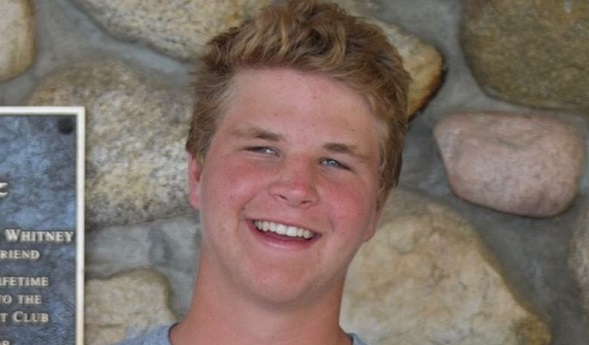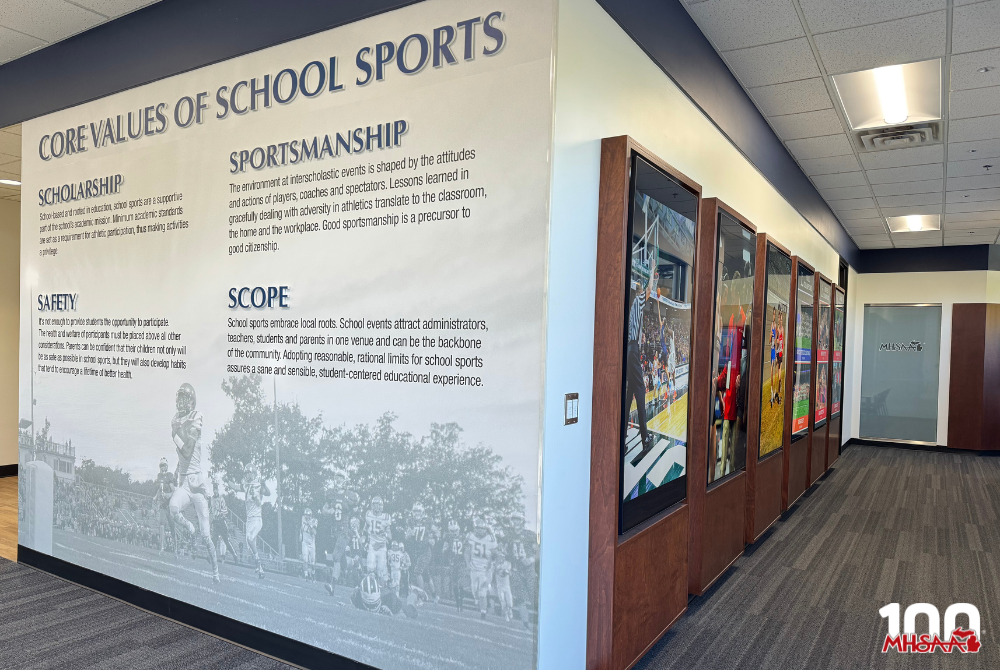
'I Wouldn't Have Done it Any Other Way'
June 27, 2019
By Geoff Kimmerly
Second Half editor
Gray Raymond would like to believe every high school golfer would’ve made the same call as he did on the final hole of his Regional this spring. And he hopes those who wouldn’t might hear about his story and reconsider next time they have the opportunity.
Three weeks after calling out an otherwise-unseen stroke on himself – which eventually may have kept him from an opportunity to advance to the MHSAA Finals – the Maple City Glen Lake now-junior can’t imagine making any other decision.
His story received some publicity close to home, but in case you hadn’t heard: Raymond finished his sophomore season by shooting a team-best 85 to lead Glen Lake to a fifth-place Division 4 Regional finish May 29 at Treetops’ Tradition in Gaylord. On the final hole, after his playing partners had finished up, Raymond approached his ball for a 5-inch tap in – and accidentally nudged the ball, by rule a stroke.
No one else saw it. No one else would’ve ever found out. But Raymond would’ve known – and he immediately called out the unintended hit so it could be recorded on his card.
Strokes are lost and gained throughout a golf round, so it shouldn’t be said that one made the difference. But when results for the day were posted, Raymond found out he potentially missed qualifying for the Finals by one shot. Taking a shot off his score would've put him in a tie for the third and final individual qualifier spot and set up a playoff with Mackinaw City's Kal O'Brien. Instead, O'Brien claimed that last Finals berth unopposed.
“I wouldn’t have done it any other way. That’s not the way I was taught, and definitely not the way I was raised,” Raymond said Wednesday as he loaded up a bucket of balls at the driving range. “I’d rather lose than be a cheater.
“At the time, I was just upset that I lost, pretty much. I didn’t think anyone really would care how it happened. I didn’t think anything of it until I got to school on Monday and my teachers were congratulating me and stuff like that.”
Raymond’s sportsmanship made a longer-lasting impression than probably most of the rounds played across the Lower Peninsula at Finals the following weekend. The story was picked up by the local Leelanau Enterprise for a story June 5, and last week Raymond was honored by Glen Lake’s board of education with the “Anchor Up!” Award,” which he said is given to adults for their contributions to the school district. He thinks he was the first student to receive it.
 Raymond also was the subject of a now well-traveled email to members of the Northwest Conference from Suttons Bay’s four-time Division 4 champion coach Todd Hursey, who wrote in part, “My heart goes out to him, but my heart is also warmed by his integrity. These moments should be celebrated as much as the golfing accomplishments.”
Raymond also was the subject of a now well-traveled email to members of the Northwest Conference from Suttons Bay’s four-time Division 4 champion coach Todd Hursey, who wrote in part, “My heart goes out to him, but my heart is also warmed by his integrity. These moments should be celebrated as much as the golfing accomplishments.”
Raymond learned the game in large part from his father Ron, who played in high school and college and who “made it clear at a young age, no matter what happens out there, rules come first. I definitely learned from classroom to green to tee,” Gray Raymond said.
The golf community can become close-knit, especially among the top players at the high school age levels, and Raymond said he’s received texts from quite a few competitors from other schools telling him “that was a really bold move” and offering plenty of support – including reminding him of the big picture, and how missing these Finals will end up just a detail in what should be two more great years of high school golf.
And Wednesday included, Raymond already is getting ready. He’s definitely going to adjust his approach next time. At this Regional, he was playing with that day’s eventual winner Will Newbold, and knowing he was a number of strokes back of the Frankfort ace figured he didn’t have a chance to qualify and let that sink his mental game – when in reality he was right in the running. Raymond would’ve played at least one hole a little differently to give himself a better shot.
And absolutely, it will be that much more rewarding when Raymond, perhaps inevitably, does qualify for the Finals over the next two seasons.
“I wouldn’t have been able to call myself a golfer, honestly, if I’d walked out to that first tee box at states, Raymond said. “People are saying not many high school kids would do that, to immediately just call (a stroke) on yourself. But it never crossed my mind not to.
“I would like to say they would (call it), but honestly I don’t know. I would hope so. I hope everyone has the mindset of well, I messed up. There’s always a consequence of something, positive or negative, and if I walked away there’s no consequence – so what’s the lesson learned there?”
PHOTOS courtesy of Maple City Glen Lake’s athletic department.

Century of School Sports: Guided by 4 S's of Educational Athletics
By
Geoff Kimmerly
MHSAA.com senior editor
October 8, 2024
The display above greets visitors at the top of our staircase to the second floor at the MHSAA office in East Lansing – a group of guests that annually numbers well over a 1,000 administrators, student leaders, game officials and several others who are invested in school sports.
We hope these four core values – the MHSAA’s oft-referred to “four S’s” of educational athletics – also lead our guests’ interactions in school sports as they return home to their communities across the state.
They are as follows:
SAFETY
- It's not enough to provide students the opportunity to participate. The health and welfare of participants must be placed above all other considerations. Parents can be confident that their children not only will be as safe as possible in school sports, but they will also develop habits that tend to encourage a lifetime of better health.
SCHOLARSHIP
- School-based and rooted in education, school sports are a supportive part of the school's academic mission. Minimum academic standards are set as a requirement for athletic participation, thus making activities a privilege.
SPORTSMANSHIP
- The environment at interscholastic events is shaped by the attitudes and actions of players, coaches and spectators. Lessons learned in gracefully dealing with adversity in athletics translate to the classroom, the home and the workplace. Good sportsmanship is a precursor to good citizenship.
SCOPE
- School sports embrace local roots. School events attract administrators, teachers, students and parents in one venue and can be the backbone of the community. Adopting reasonable, rational limits for school sports assures a sane and sensible, student-centered educational experience.
These values were coined by John E. “Jack” Roberts, the fourth of now five full-time executive directors who have served the MHSAA during its 100-year history. He introduced them during his first days on the job in 1986 – and as he noted in an installment of his “From the Director” blog in 2015, they’ve stood the test of time.
They drove the Association’s work during his tenure, surely before it, and continue to do so today – and we will delve into all four as we continue our storytelling of a “Century of School Sports” during this 2024-25 school year.
Previous "Century of School Sports" Spotlights
Sept. 25: Michigan Sends 10 to National Hall of Fame - Read
Sept. 25: MHSAA Record Books Filled with 1000s of Achievements - Read
Sept. 18: Why Does the MHSAA Have These Rules? - Read
Sept. 10: Special Medals, Patches to Commemorate Special Year - Read
Sept. 4: Fall to Finish with 50th Football Championships - Read
Aug. 28: Let the Celebration Begin - Read
PHOTO A display on the second floor of the MHSAA office outlines the four core values of educational athletics: safety, scholarship, sportsmanship and scope.

